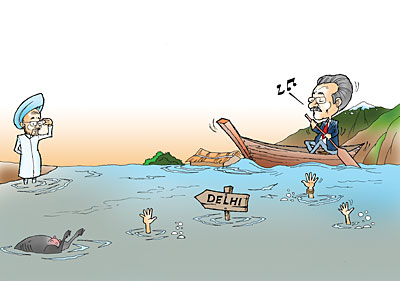 BILASH RAI |
Pushpa Kamal Dahal would like to forget the fact, but the Maoists owe their phenomenal rise partly to the overt and covert support of the Indian establishment. On the 12-point understanding that allowed for the safe landing of the decade-old armed insurgency, Indian Finance Minister Pranab Mukherjee once claimed on camera that New Delhi had engineered the deal. He didn't elaborate on how his operatives had acquired so much influence in an outlawed organisation.
It's less clear how Dahal and his comrades lost the confidence of their Indian sponsors, but the souring of the relationship must have begun quite early. After the formation of the Maoist-led coalition government, the Indian Foreign Office organised a seminar in Patna in April 2008, innocuously titled: 'Emerging trends in India-Nepal relations'. In retrospect, it appears that the meet was organised to tell the Maoists to deliver on promises made in the past, or ready themselves to face the consequences.
There are limits to what any government in Nepal can do to satisfy the ever-increasing demands of New Delhi. Singha Darbar can't afford to ignore the real or imagined security concerns of Beijing. It would have been political suicide for the Maoists to sign on the dotted line of every document drafted by South Block officials. But India now wants to penalise the Maoists for their failure to deliver.
Caretaker Premier Madhav Kumar Nepal probably knew that his utility was limited to humiliating Girija Prasad Koirala and cornering the Maoists. He bought a deal merely to satisfy his urge to get what Gyanendra had once denied him � a stint in Baluwatar. Having realised his life's ambition, he has no further reason to humour meddlesome Indian interlopers. Strategists of Nepal policy in New Delhi must be alarmed by the turn of events in Kathmandu: they have alienated the Nepali Congress, lost the Maoists, maligned the Madhesbadis, and failed to wean away the military-dominated establishment (of which the UML is part) from their Western benefactors. In frustration, they are probably contemplating something as drastic as the 'Nepal Gameplan' propaganda war of June 2000, when India Today became the vehicle of a concerted disinformation campaign.
Seizing on the pre-Dasain indolence in Nepali politics and the media, the Indian Express charged the Maoists with training hundreds of Indian Naxalites on Nepali soil under the supervision of 'terrorists from Lashkar-e-Toiba'. Only the fertile mind of a misinformation expert could have made such a leap of faith in associating an extremist Islamic group with avowedly anti-religious leftwing radicals. The reporter attributed the 'news' to a Ministry of Home Affairs note accessed by the paper. It seems to be a clear case of what New Delhi scribes call 'handout journalism', wherein renowned journalists lend their names to propaganda pieces from the government in exchange for important tip-offs once in a while.
The Nepali response to the allegation has been surprisingly muted so far. Meanwhile, the Indian disinformation campaign has continued with the arrest of Nepali citizens on charges of possessing Indian Maoist pamphlets. Does this mean Nepalis should be wary of being caught with anything penned by Arundhati Roy, lest they be accused of supporting the Naxalites?
In a rare show of restraint, the irrepressible economist and US Ambassador to India John Kenneth Gaibraith once wrote, "The press in India is free, but co-operative." It has since been co-opted completely, with the pen, the microphone and the camera doing the bidding of the government meekly.
For all its shortcomings, the Nepali media takes the role of permanent opposition more seriously than its Indian counterparts. However, when national integrity is under attack from foreign propaganda, the media has to line up with the government and the opposition to withstand the pressure. The Indian press behaves like 'partners in governance' on issues of foreign policy. The Nepali media will have to learn to juggle these roles during the times of crisis to come.
READ ALSO:
Forcing tasks
The value of deadwood, DAMAKANT JAYSHI
"We are not a failed state yet"



